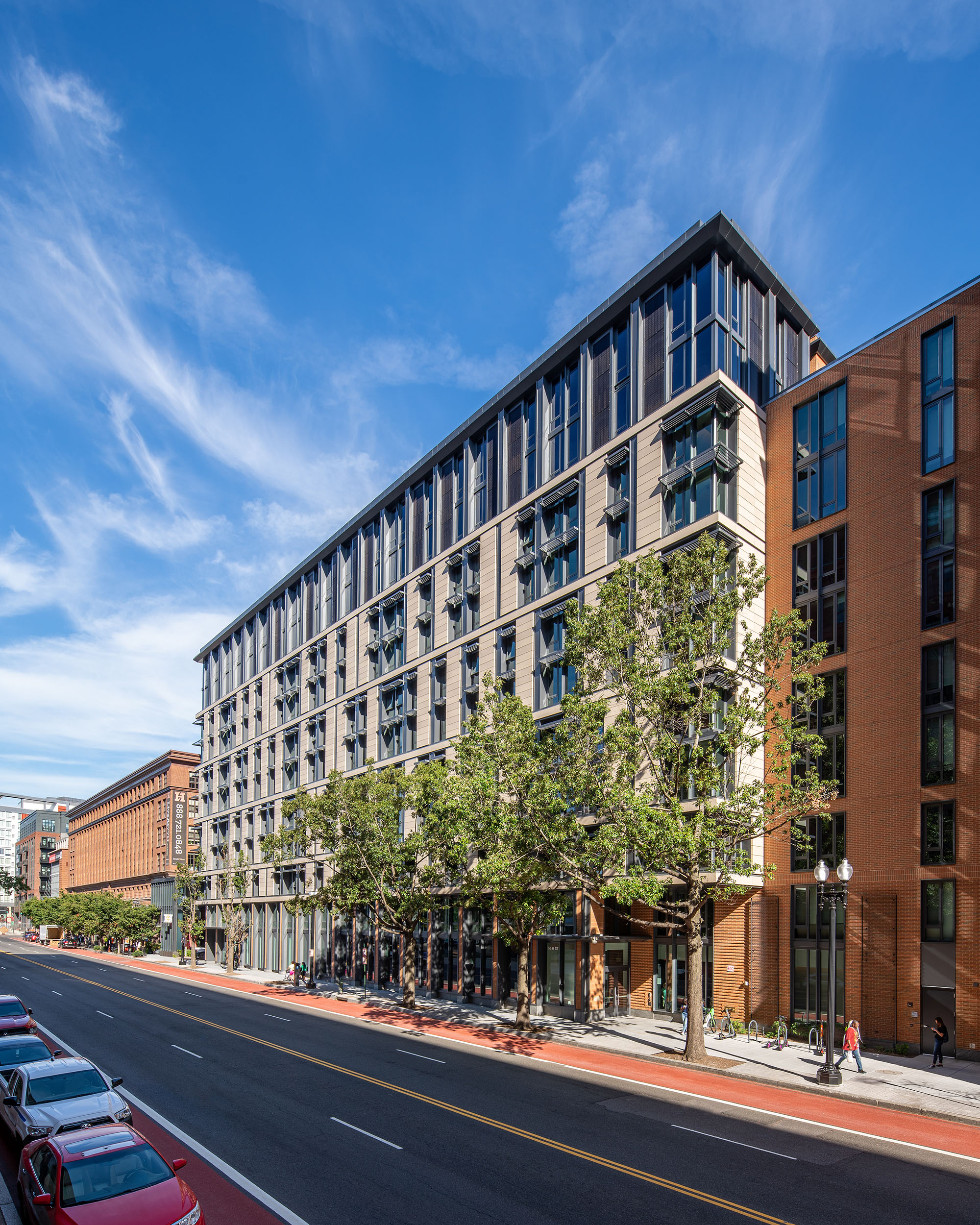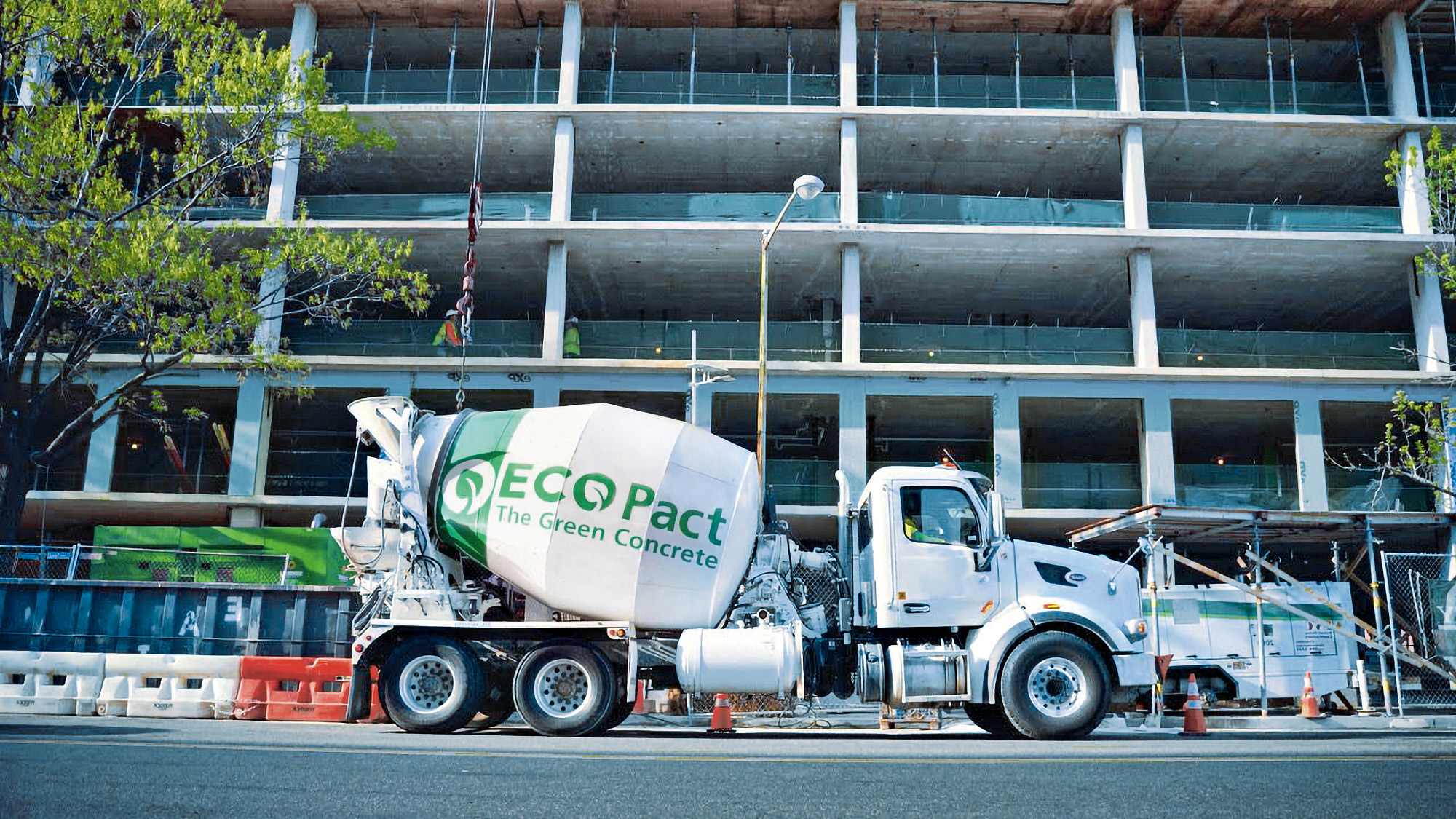Months ago we heard news of the “nation’s first carbon-positive hotel”—a 13-floor, 130-000-sf cement tower with a triangular layout and eye-shaped windows. Populus, designed by Studio Gang and developed by Urban Villages, broke ground in Denver, Colo., last year with plans to be operational by summer 2024. What makes Populus a carbon-positive project is a collection of variables, from minimizing waste to using fewer finish materials. But there’s one huge driver behind the green initiative: sustainable concrete.
ECOPact is an optimized, low-carbon concrete made from large amounts of supplementary cementitious materials (SCM). With lower embodied carbon content compared to conventional concrete, ECOPact aims to be an attractive alternative for sustainability-driven engineers.
Sustainable concrete: ECOPact
Designed by Holcim, a sustainable building materials supplier, ECOPact offers a low-carbon alternative that not only meets, but exceeds the properties of standard (CEM I) concrete. This allows the material to be used in all traditional applications: structural components like foundations, columns and beams; to walls, driveways, bridges, and more.

ECOPact Tiers
Rather than having a one-size-fits-all product, Holcim delivers ECOPact in a three-tiered system:
- ECOPact (30–50% reduction in carbon emissions)
- ECOPact Prime (50–70% reduction)
- ECOPACT Max (70–90% reduction)
Each tier can be enhanced with the addition of recycled concrete aggregates ECOPact+ range, according to the company. Kevin Peart, Senior Vice President and General Manager of the Mountain Region, Holcim, believes that Holcim has become “one of the first movers in the concrete industry.”
For the Populus hotel, this sustainable concrete was integral to the design process. The project’s utilization of ECOPact accounts for 65% of the total cubic yards of concrete poured, with an anticipated reduction of 765 tons in the concrete's embodied carbon compared to traditional concrete.

A similar story is told at 55 H Street, a Georgetown University residence hall (above). The project team had a specific challenge: they needed a concrete blend capable of attaining a 28-day design strength of 5,000 psi, while also achieving a high-early strength of 3,000 psi within a span of two to three days. ECOPact delivered, and 55 H Street became “one of the most sustainable buildings in D.C.,” says Zachary Lovett, Project Pursuit Manager, Holcim.
As the built environment continues to find ways to reduce its impact on the planet, innovative materials like ECOPact may help drive the change that architects, engineers, and contractors desire.
Related Stories
| Aug 11, 2010
Nurturing the Community
The best seat in the house at the new Seahawks Stadium in Seattle isn't on the 50-yard line. It's in the southeast corner, at the very top of the upper bowl. "From there you have a corner-to-corner view of the field and an inspiring grasp of the surrounding city," says Kelly Kerns, project leader with architect/engineer Ellerbe Becket, Kansas City, Mo.
| Aug 11, 2010
AIA Course: Historic Masonry — Restoration and Renovation
Historic restoration and preservation efforts are accelerating throughout the U.S., thanks in part to available tax credits, awards programs, and green building trends. While these projects entail many different building components and systems, façade restoration—as the public face of these older structures—is a key focus. Earn 1.0 AIA learning unit by taking this free course from Building Design+Construction.
| Aug 11, 2010
BIM adoption tops 80% among the nation's largest AEC firms, according to BD+C's Giants 300 survey
The nation's largest architecture, engineering, and construction companies are on the BIM bandwagon in a big way, according to Building Design+Construction's premier Top 50 BIM Adopters ranking, published as part of the 2009 Giants 300 survey. Of the 320 AEC firms that participated in Giants survey, 83% report having at least one BIM seat license in house, half have more than 30 seats, and near...
| Aug 11, 2010
Integrated Project Delivery builds a brave, new BIM world
Three-dimensional information, such as that provided by building information modeling, allows all members of the Building Team to visualize the many components of a project and how they work together. BIM and other 3D tools convey the idea and intent of the designer to the entire Building Team and lay the groundwork for integrated project delivery.
| Aug 11, 2010
Great Solutions: Healthcare
11. Operating Room-Integrated MRI will Help Neurosurgeons Get it Right the First Time A major limitation of traditional brain cancer surgery is the lack of scanning capability in the operating room. Neurosurgeons do their best to visually identify and remove the cancerous tissue, but only an MRI scan will confirm if the operation was a complete success or not.
| Aug 11, 2010
Great Solutions: Collaboration
9. HOK Takes Videoconferencing to A New Level with its Advanced Collaboration Rooms To help foster collaboration among its 2,212 employees while cutting travel time, expenses, and carbon emissions traveling between its 24 office locations, HOK is fitting out its major offices with prototype videoconferencing rooms that are like no other in the U.
| Aug 11, 2010
2009 Judging Panel
A Matthew H. Johnson, PE Associate Principal Simpson Gumpertz & HegerWaltham, Mass. B K. Nam Shiu, SE, PEVP Walker Restoration Consultants Elgin, Ill. C David P. Callan, PE, CEM, LEED APSVPEnvironmental Systems DesignChicago D Ken Osmun, PA, DBIA, LEED AP Group President, ConstructionWight & Company Darien, Ill.
| Aug 11, 2010
Inspiring Offices: Office Design That Drives Creativity
Office design has always been linked to productivity—how many workers can be reasonably squeezed into a given space—but why isn’t it more frequently linked to creativity? “In general, I don’t think enough people link the design of space to business outcome,” says Janice Linster, partner with the Minneapolis design firm Studio Hive.







